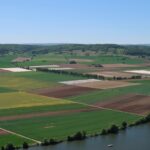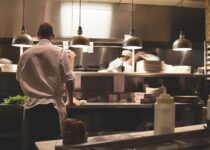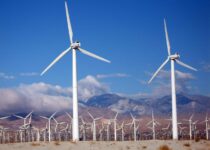MABEWO BLUE PLANET: Exploring as a technology pioneer

Sustainability, profitability, safety and social responsibility – MABEWO stands for „Make a better world“ – MABEWO Blue Planet is committed to climate protection.
MABEWO BLUE PLANET AG participates in projects for the use of renewable energies and develops a unique technology portfolio in the field of renewable energies. In doing so, the company sets new standards in terms of innovation and economic efficiency. Topics are landfill degassing, biogas plants, small hydropower plants and solar energy. Board member Jörg Trübl is at home as an environmental engineer in the field of sustainable production processes. „Resources such as land, soil, water and nutrients must be conserved and used effectively, and therein lies one of the greatest challenges for climate protection. The MABEWO Group sees a key in indoor farming for local supply with the combination of renewable energies,“ explains Jörg Trübl. Standing still in this area is not the order of the day, because through technological progress and further development, scientists worldwide are working on sustainability for climate change. The MABEWO Group, consisting of the companies Food & Energy Campus Gross-Gerau GmbH, MABEWO PHYTOPHARM AG, MABEWO BLUE PLANET AG, MSP Construction AG, MSW Mechatronik & Schweisswerkstatt and MABEWO 360 GmbH and has embarked on a voyage of discovery as a technology pioneer to put together building blocks that produce synergies, says Jörg Trübl in conversation. „In addition to generating renewable electricity, we want our projects to make a valuable contribution to reducing CO2 emissions. The focus is on the further development and expansion of regenerative energies in markets that are hardly developed. The MABEWO Group is working on actively shaping the energy turnaround through sustainably generated electricity and feeding it into the public grid,“ explains Jörg Trübl.
Indoor Farming: The Future of Agriculture – Needs a lot of Energy
Indoor farming solutions of the MABEWO Group are operated under the brand Food & Energy Campus Groß-Gerau GmbH. The production of vegetables, mushrooms or herbs, for example, takes place in so-called Green Domes and combines solar energy and indoor farming. Inside the dome, modules provide ideal growing conditions for the plants, while the solar panels on the roof ensure the energy supply. The topic of hydrogen is currently coming into focus. Jörg Trübl explains: „Hydrogen can be produced directly from biomass by biological and chemical processes and thus becomes so-called biohydrogen. In addition to the fermentation process or thermochemical processing, living biomass can also lead to the production of hydrogen. For this purpose, for example, cyanobacteria or algae are used, which provide for hydrogen production in various metabolic processes such as photosynthesis. Managing director Stefan Ruckelshaußen, organic farmer of our subsidiary Food & Energy Campus Groß-Gerau GmbH has recognized this. For many years, he has been pursuing the idea that cycles must be closed and resources must be put to further use. For him, nature is the model, everything is recycled, waste does not exist in nature.“ On the grounds of the Food & Energy Campus, about 50 farmers from the region supply about 24,000 tons of energy crops, including sweet sorghum and green rye per year, which are converted into electrical energy in the biogas plant and supply about 2300 households with electricity.
What opportunities does hydrogen offer for agriculture?
„For that, we need to take a look at our European neighbors. The production of hydrogen peroxide has increased the production of blueberries, for example,“ explains Jörg Trübl. There is a lot of agriculture in the Huelva region of southern Spain. However, dry soils and hot temperatures, coupled with the use of organic fertilizers, can be difficult for growers. Different problems led to uneven irrigation and insufficient water and fertilizer, resulting in yield losses. One was clogged drippers and the second was poor dissolution of organic fertilizer in irrigation water. Danish company HPNow, specializing in water and air treatment solutions with the generation of hydrogen peroxide, was able to solve these problems by installing an HPGen system and connecting it to the irrigation system. „Worldwide technologies and developments are important building blocks and insights for the further development of indoor farming modules, as is the case with the MABEWO Group,“ Jörg Trübl points out.
Currently, two million tons of hydrogen are produced from natural gas in Germany. Air and water contain hydrogen. Hydrogen is the most common element in our universe, present in bound form in almost all organic compounds. „In other words, it can be found everywhere and is an ideal energy store. Chemically, however, hydrogen must be released from the compound with an expenditure of energy. Hydrogen can be stored, transported and reused. The ideal way to produce hydrogen is to use renewable energy,“ says Jörg Trübl.
V.i.S.d.P.:
Catrin Soldo
Press speaker
MABEWO AG
Contact:
MABEWO AG
Chli Ebnet 3
CH-6403 Küssnacht/Rigi
Switzerland
T +41 41 817 72 00
info@mabewo.com
Represented by Mr. Jörg Trübl
MABEWO AG stands for sustainability. „Make a better world“ invests in the future and creates livelihoods where basic needs are met: MABEWO uses photovoltaic systems for water and electricity production. MABEWO is a reliable local service provider that improves people’s lives and creates jobs. Mr. Jörg Trübl is a trained environmental engineer and has 20 years of practical economic experience in business management as a consultant, coach and CEO of SMEs in Europe. Further information under: https://www.mabewo.com/
PRESSEKONTAKT
MABEWO AG
Catrin Soldo
Chli Ebnet 3
CH-6403 Küssnacht/Rigi
Website: https://www.mabewo.com/
E-Mail : c.soldo@mabewo.com
Telefon: +41 41 817 72 00


